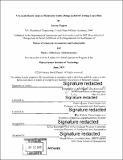A systems-based analysis method for safety design in rocket testing controllers
Author(s)
Paquin, Jeremy(Jeremy David)
Download1119731474-MIT.pdf (15.05Mb)
Other Contributors
Massachusetts Institute of Technology. Department of Aeronautics and Astronautics.
Sloan School of Management.
Leaders for Global Operations Program.
Advisor
Paulo Lozano and Roy Welsch.
Terms of use
Metadata
Show full item recordAbstract
Boeing is the prime contractor for building the National Aeronautics and Space Administration (NASA) Space Launch System (SLS) core stage for upcoming exploration missions beyond low earth orbit. Due to the rigorous demands of safety on crew-rated spacecraft, the entire vehicle undergoes captive hot-fire testing before being delivered to NASA for actual flight operations. The hot-fire test is controlled by a suite of computers used to control the rocket segment and critical infrastructure interactions during the test. The complexity of the software and hardware used to control the test makes it difficult for traditional safety approaches to identify potentially unsafe system interactions by focusing only on component failures rather than overall system interactions. Traditional chain-of-failure safety analyses and reviews take significant resources and time to conduct while leaving possible gaps. This thesis discusses a method for analyzing safety of rocket test controllers by characterizing key indicators and developing a systems-based approach for hazard analysis using Systems-Theoretic Process Analysis (STPA). A resulting case study is applied for examination of a portion of the rocket testing controller system for comparison to traditional chain-of-failure events analyses. Appling STPA in the case-study resulted in 83% of the total work time needed to complete a comparable "ascent phase" analysis using FMEA. The STPA results are the same or meet a similar intent to those resolved in the FMEA with not gaps between the two methods. The recommended mitigation and constraints resulting from STPA are arguably more intuitive than those of the FMEA.
Description
Thesis: S.M., Massachusetts Institute of Technology, Department of Aeronautics and Astronautics, in conjunction with the Leaders for Global Operations Program at MIT, 2019 Thesis: M.B.A., Massachusetts Institute of Technology, Sloan School of Management, in conjunction with the Leaders for Global Operations Program at MIT, 2019 Cataloged from PDF version of thesis. Includes bibliographical references (pages 122-123).
Date issued
20192019
Department
Massachusetts Institute of Technology. Department of Aeronautics and Astronautics; Sloan School of Management; Leaders for Global Operations ProgramPublisher
Massachusetts Institute of Technology
Keywords
Aeronautics and Astronautics., Sloan School of Management., Leaders for Global Operations Program.